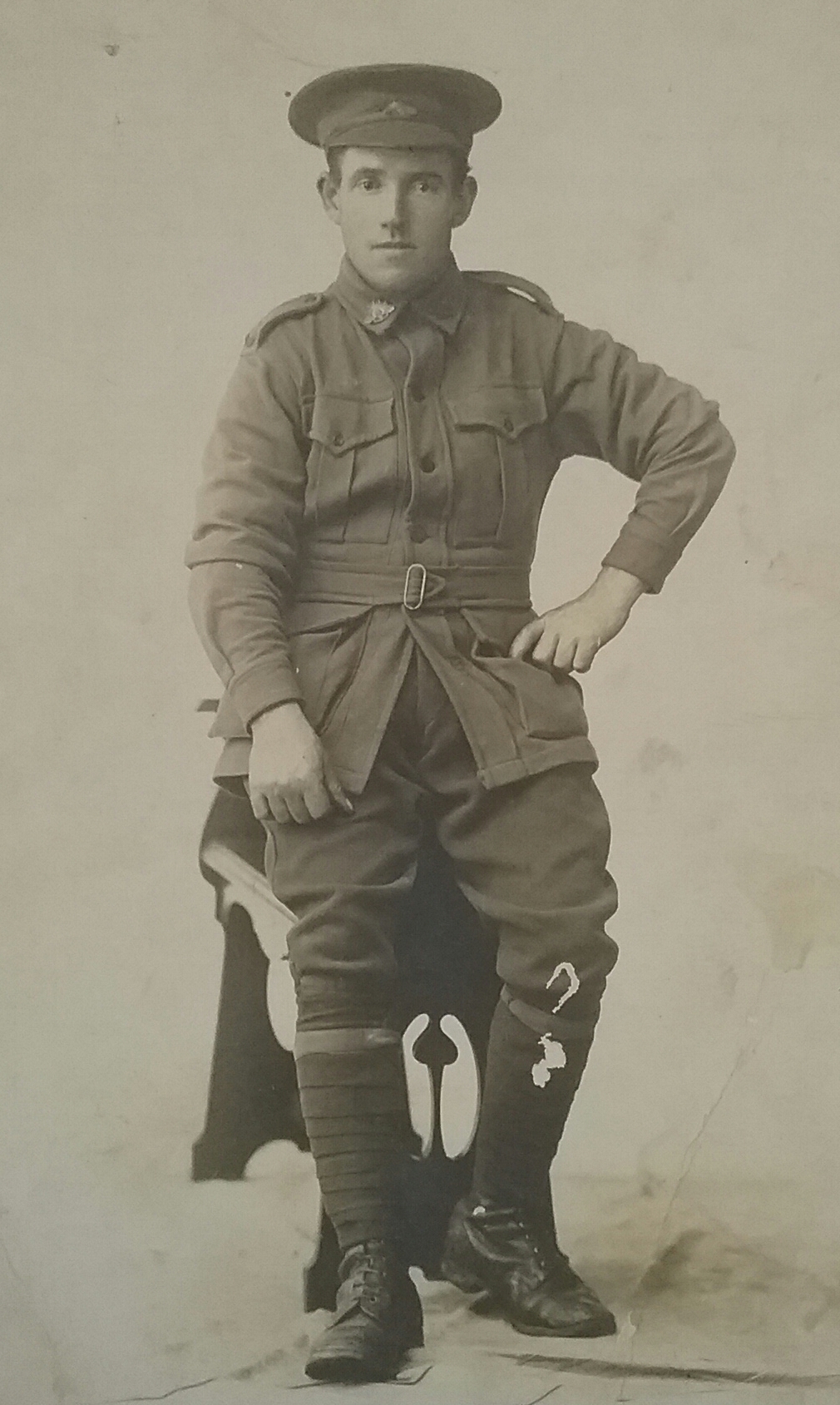Pte
John Mullins
Information about birth
|
Year of birth: 1887 |
|
Place of birth: South Melbourne, Victoria, Australia |
General information
|
Profession: Wicker Weaver |
Army information
|
Country: Australia |
|
Force: Australian Imperial Force |
|
Rank: Private |
|
Service number: 2189 |
|
Enlistment date: 23/07/1915 |
|
Enlistment place: Blackboy Hill, Western Australia, Australia |
|
Units: — Australian Infantry, 28th Bn. (Western Australia) (Last known unit) |
Information about death
|
Date of death: 05/11/1917 |
|
Place of death: Lijssenthoek, Remy Siding, No. 2 Canadian Casualty Clearing Station, Belgium |
|
Cause of death: Died of wounds (D.O.W.) |
|
Age: 30 |
Cemetery
|
Lijssenthoek Military Cemetery Plot: XXI Row: EE Grave: 11 |
Distinctions and medals 3
|
1914-15 Star Medal |
|
British War Medal Medal |
|
Victory Medal Medal |
Points of interest 3
| #1 | Place of birth | ||
| #2 | Enlistment place | ||
| #3 | Place of death (approximate) |
My story
John Mullins, a 30-year-old wicker weaver from Melbourne died of gas poisoning on the 5th of November 1917. At the time John served with the 28th Battalion Australian Infantry near Zonnebeke.
On the 27th of October 1917 the Battle of Passchendaele was coming to an end. Most Anzac forces were being relieved from the frontlines, as the Canadians were preparing to capture the Passchendaele heights. That day the 28th Battalion took up positions on the Broodseinde Ridge between Cyclops and the hamlet of Noordemdhoek. Battalion Headquarters and the Regimental Aid Post were situated in the hamlet of Molenaarelsthoek.
Throughout the night the surrounding areas were shelled. Especially the Broodseinde Ridge and road were shelled. Remus Wood was occasionally shelled with shrapnel and bursts of machinegun fire regularly came from Cemetry Wood. At the end of the day, three other ranks were wounded and two men were gassed.
The shelling continued on the following day. The forward areas on the Broodseinde Ridge were heavily shelled during the morning. While the afternoon passed in relative quiet, the artillery fire increased at night. Large number of gas shells were put down on the Battalion’s positions. The back areas at Anzac and Westhoek Ridges received particular attention.
John Mullins, an HQ runner, was gassed on the 28th of October 1917, when a gas shell fell in the mouth of the runners’ dug-out. John, and about fifteen others suffered from gas poisoning. They were evacuated to the hinterland. John was admitted in No. 2 Canadian Casualty Clearing Station, at Lijssenthoek near Poperinge. John was in great agony and died a couple of days later on the 5th of November 1917. He left behind his fiancé Violet and his daughter, Marjorie.
On the 27th of October 1917 the Battle of Passchendaele was coming to an end. Most Anzac forces were being relieved from the frontlines, as the Canadians were preparing to capture the Passchendaele heights. That day the 28th Battalion took up positions on the Broodseinde Ridge between Cyclops and the hamlet of Noordemdhoek. Battalion Headquarters and the Regimental Aid Post were situated in the hamlet of Molenaarelsthoek.
Throughout the night the surrounding areas were shelled. Especially the Broodseinde Ridge and road were shelled. Remus Wood was occasionally shelled with shrapnel and bursts of machinegun fire regularly came from Cemetry Wood. At the end of the day, three other ranks were wounded and two men were gassed.
The shelling continued on the following day. The forward areas on the Broodseinde Ridge were heavily shelled during the morning. While the afternoon passed in relative quiet, the artillery fire increased at night. Large number of gas shells were put down on the Battalion’s positions. The back areas at Anzac and Westhoek Ridges received particular attention.
John Mullins, an HQ runner, was gassed on the 28th of October 1917, when a gas shell fell in the mouth of the runners’ dug-out. John, and about fifteen others suffered from gas poisoning. They were evacuated to the hinterland. John was admitted in No. 2 Canadian Casualty Clearing Station, at Lijssenthoek near Poperinge. John was in great agony and died a couple of days later on the 5th of November 1917. He left behind his fiancé Violet and his daughter, Marjorie.
Sources 4
|
AIF-project https://www.aif.adfa.edu.au/ShowPerson?pid-217469 Further reference |
|
Australian War memorial https://awm.gov.au/advanced-search/people Further reference |
|
CWGC https://www.cwgc.org/find-war-dead/casualty/431582/mullins,-john/ Sources used |
|
The long long trail http://www.longlongtrail.co.uk/army/ Sources used |
